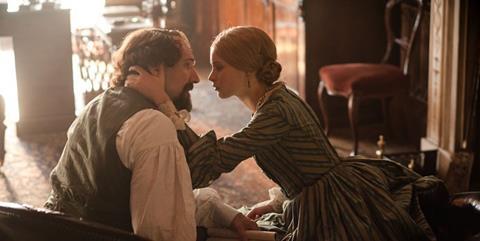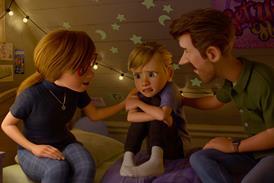Dir: Ralph Fiennes. UK. 2013. 111mins

An enthralling and beautifully performed period drama that delves into the complex love life of one Charles Dickens, the absorbing The Invisible Woman is the perfect platform for director/actor Ralph Fiennes to deliver a spellbinding turn as the vibrant force-of-nature Dickens who has a secret long-term love affair with beautiful young actress Ellen Ternan.
The strength of the film is Morgan’s astute and layered script and the strong performances that bring out the depths and contradictions of the characters.
An impressive script from Abi Morgan (Shame, The Iron Lady) teeters on the edge of Victorian melodrama at times as the will-they-won’t-they love affair has to face up to propriety and good manners, but while Fiennes often dominates the film as the ebullient and energetic writer/actor Dickens, just as memorable is the beautifully judged performance by Felicity Jones as the young actress who is entranced by his abilities and personality but is equally haunted and tormented by the memories of their relationship.
The film has all of the credentials to attract awards attention – as well as performances, the script, cinematography and design are all pitch perfect – though whether this literary love affair has the passion to attract mainstream audiences remains to be seen. But the presence and promotional push of Fiennes should boost release and strong reviews should help momentum.
The film opens with a stunning shot of a woman striding across a deserted Margate beach in 1885. She is Nelly Wharton Robinson (Jones), the wife of a school headmaster (Tom Burke) who is heading back to take charge of rehearsals for a play called No Thoroughfare: A Drama In Five Acts, written by Dickens and Wilkie Collins. The rehearsals also ignite memories of her lost life – and one that still haunts her – when she was a young actress named Ellen Ternan and first met Dickens.
As an 18 year-old she performed with Dickens alongside her mother, Mrs. Ternan (Kristin Scott Thomas), and sister Maria (Perdita Weeks), in Dickens’ adaptation of his friend Wilkie Collins’ (Tom Hollander) play, The Frozen Deep. Dickens is at the height of his fame (aspects of the film also have resonances with the contemporary obsession with fame, as Dickens is surrounded by fans and adopts false names to hide), but he no longer loves his wife Catherine (a wonderfully stoical Joanna Scanlan), and finds in Ellen a young woman who appreciates him and his work.
Slowly and delicately the two begin a passionate affair that they keep secret for years. But Dickens will never marry her (he adopted the name Mr Tringham when he ‘visited’ her in the house he buys her) and he is determined to keep her a secret, with Nelly gradually – and rather sadly – coming to accept her life as an ‘invisible woman’.
The strength of the film is Morgan’s astute and layered script and the strong performances that bring out the depths and contradictions of the characters. Dickens is a tireless personality (much is made of his fast-paced walks that Ellen replicates later in life) but also a problematic. Loving, compassionate and generous, but also selfish and self-centered, he is a man who wants everything but can give up very little. In a striking scene towards the end, he and Ellen are involved in a train crash, but he still leaves her bleeding on the ground to hurry off to organise helping others, but still finds time to pick up a page from his manuscript of Great Expectations.
Based on Claire Tomalin’s biography of Ternan, the film is beautifully directed by Fiennes, and while his own performance comes close to overpowering the film at times, it is to the impressive Felicity Jones’ credit that her turn as a gentle – and not overly talented – young actress carries a real depth, and she is especially strong in the scenes after Dickens’s death when she lives a new life, but is still haunted by the past. The supporting cast is equally fine, from Kristen Scott Thomas as Ellen’s concerned mother through to Tom Hollander as the loyal Wilkie Collins (whose relationship with a woman who he does not want to marry and yet loves deeply plays a key part in the film).
The Invisible Woman also paints a wonderful portrait of the literary and theatrical world of the time, with Dickens and Collins delightfully hamming it up on stage; Dickens staging readings as a way of selling his books and the Ternan family of traveling the country to perform in minor plays. It also – naturally – allows for aspects of the story to act of echoes for some of Dickens’ work (though this is never over-emphasised), and certainly reveals a complex, talented and energetic man caught up in his own cult of personality, yet also a man who loved this young woman (in his own complex way) up until his death.
Production companies: Headline Pictures Ltd., Magnolia Mae Films, BBC Films, British Film Institute
International sales: WestEnd Films, www.westendfilms.com
Producers: Gaby Tana, Stewart Mackinnon, Christian Baute, Carolyn Marks Blackwood
Screenplay: Abi Morgan, based on the book The Invisible Woman: The Story Of Nelly Ternan And Charles Dickens by Claire Tomalin
Cinematography: Rob Hardy
Editor: Nicolas Gaster
Production designer: Maria Djurkovic
Main cast: Ralph Fiennes, Felicity Jones, Kristin Scott Thomas, Tom Hollander, Joanna Scanlan, Perdita Weeks, Amanda Hale, Tom Burke, John Kavanagh, Michael Marcus




















